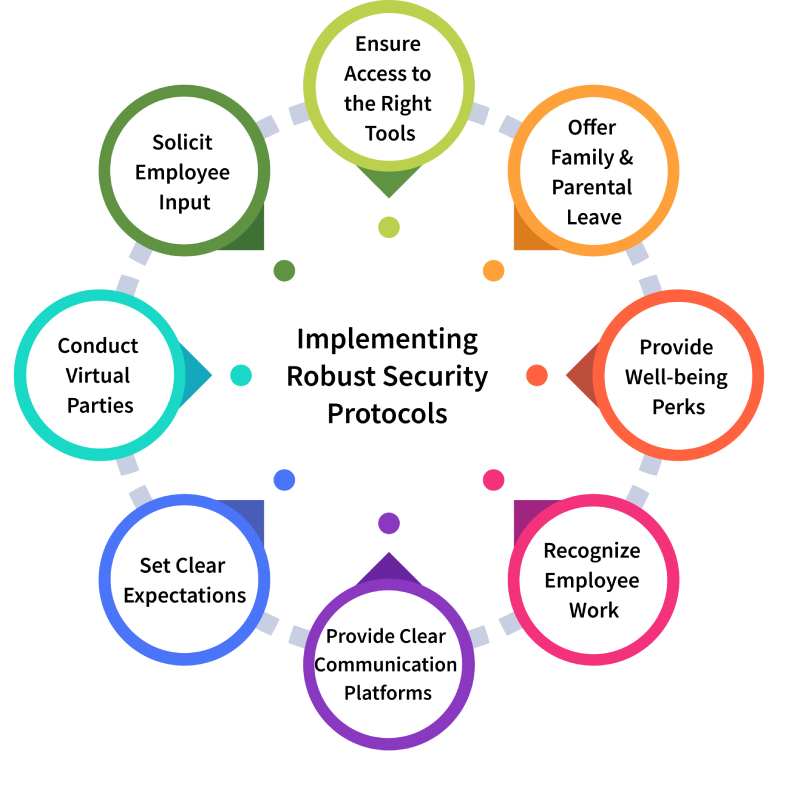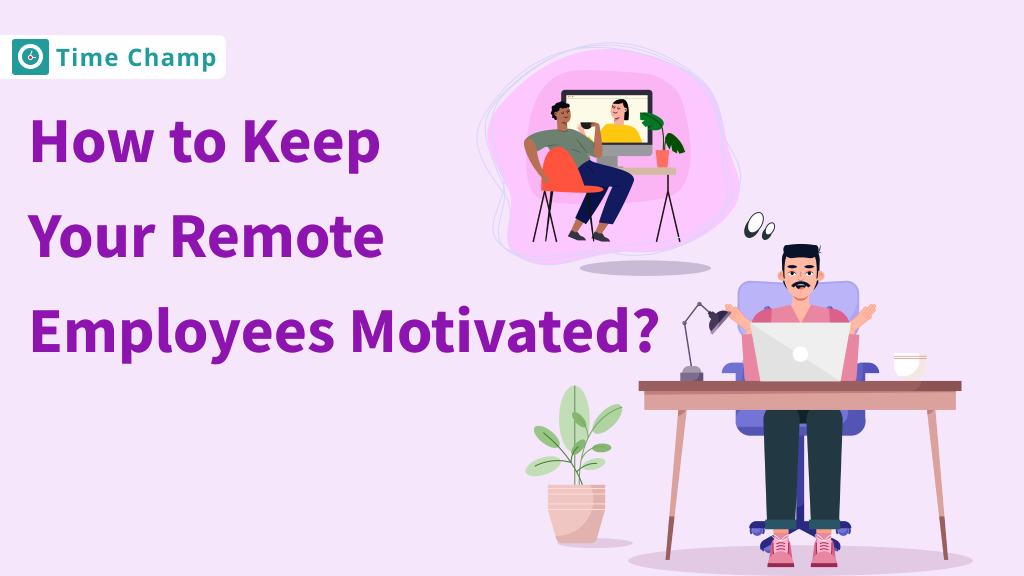Imagine your remote
employees aren’t hitting
their goals, tasks are slipping
through the cracks, and deadlines
are constantly missed. Sounds
stressful, right?
You might
think the problem is a lack of focus
or commitment. But in reality, it
often comes down to something else,
the motivation.
Yes, you read
that right! Lack of motivation is
the real issue.
But don’t
worry!
In this blog, you will
learn how to keep your remote
employees motivated and focused
without any micromanagement and
pressure.
Why does Remote Employee Motivation Matter?
Motivation is important at work
because it helps employees do their
jobs well, feel good, and help the
company do better. When remote
employees are motivated , they pay
more attention to their tasks,
finish more work, and do it better.
Motivated
employees also come up with
new ideas, take action on their own,
and work well with others. This
helps both the employees and the
company reach their
goals.
Motivation reduces
employee turnover. When employees
feel appreciated and motivated, they
are less likely to leave, when the
company doesn’t need to hire new
people. A motivated team makes the
workplace happy and supportive. This
leads to better results for the
company, such as making more money
and having happier customers.
Ways to Motivate Remote Employees

1. Offer Family and Parental Leave
Every employee deserves family leave,
especially remote
employees. Giving family and
parental leave shows that you care
about your employees as people, not
just for their work. In remote jobs,
workers often have to handle both
their jobs and personal things like
taking care of kids or older family
members. By giving flexible and paid
leave for family emergencies, or
other personal needs, you help them
manage their life
better.
Having a
family-friendly workplace also helps
keep employees longer. When workers
feel their work-life
balance is important to the
company, they are happier and more
likely to stay. It motivates them to
work better which eventually drives
success
for the organization.
2. Provide Well-being Perks
Remote workers’ health is
sometimes forgotten but keeping them
happy and productive is important.
Giving help for health, like support
for mental health, fitness programs,
or better work tools, shows you care
about them. This help can lower
stress, keep workers active,
and help them manage both work and
home life, even while
working from
home.
Health support
doesn’t have to be expensive. It can
be as simple as giving extra days
off for mental health, discounts for
gyms, or apps for meditation. When
workers feel cared for, they focus
better, work harder, and are less
tired.
3. Recognize Employee Work
Remote
employees can often feel
left out and think no one sees their
hard work. It is important to show
them that you notice and appreciate
the work they do. Rewarding
or celebrating their work
can be small or big, will make them
feel motivated and loved. It can be
as easy as saying ‘ great
job’ during a meeting, sending
thank you messages can make them
feel valued. When employees feel
appreciated or rewarded, they are
more likely to get things done
smoother and faster.
You can
also create fun programs, like
‘Employee of the Month’,
or offer rewards to those who
perform really well. Telling
everyone about their good work makes
remote workers feel important and
encourages them to keep doing their
best.
4. Provide Clear Communication Platforms
Good
Communication is a challenge
for remote teams. Without
meeting in person, it’s easy for
messages to get mixed up, causing
confusion. To fix this, you need to
provide your remote workers with
simple and clear tools for
communication. Apps like Slack,
Zoom, or Microsoft Teams make it
easy for employees to work together,
ask questions, and stay updated on
what’s happening at the
company.
Creating separate
channels for different teams,
projects, or casual chats helps keep
things organized. Having clear rules
about how and when to use these
channels makes communication easier,
too.
For example, using Slack
for communication, and Zoom for
video conferences can make employees
engaged and feel good.
5. Encourage Career Development
Giving remote employees’ chances to grow is a good way to keep them motivated. Offering training, workshops, and courses helps them learn new skills and feel more connected to their work. Regularly talk about their goals and give them projects because it helps them learn more. When employees see they can grow in the company, they are more likely to stay motivated and loyal.
6. Trust Your Team
Trust plays a crucial role in motivating your remote employees. To motivate remote workers, one of the best things you can do is to trust them to handle their tasks independently. Constantly micromanaging can lower morale and lead to drops in productivity. Once you give a task to a team member, allow them the space to complete it without jumping in — unless they specifically ask for help. When assigning tasks, be clear about the desired results, and understand that they might approach the work differently than you would — and that’s perfectly okay.
7. Conduct Virtual Parties
Remote employees often miss the
friendships and connections that
happen in the office. It’s a good
idea to plan virtual parties and
team activities to help your remote
workers feel like part of a team.
They can be as basic and
entertaining as quizzes, virtual
happy hours, or organized virtual
parties with certain
themes.
The activities allow
the employees to unwind, ease their
boredom, and communicate with each
other in different ways other than
reporting to work. When they feel
connected to the team, they are
happier at their jobs and stay
motivated.
For example, you can
plan a holiday party where employees
wear fun costumes, play games, and
join online contests which helps
everyone relax.
8. Solicit Employee Input
Your remote employees likely have
valuable insights and ideas that can
help improve the company’s processes
or remote
work culture. Ask your
employees for their feedback often.
This shows that you care about what
they think and are willing to make
changes if needed. You can do this
by conducting surveys, using online
suggestion boxes, or having open
talks. You will spot problems early.
When employees feel their voices are
heard, they become more engaged and
interested in the
organization’s
success.
You could conduct a
feedback survey every quarter and
ask your employees how they feel
about their work, company rules, or
remote work environment. Make sure
to use this feedback to implement
changes.
9. Ensure Access to the Right Tools
Remote work will be easy if employees have access to the right tools and a proper setup. Teams should have ways to talk to each other, make video calls, and communicate through messaging apps like Slack, etc. Train your remote employees regarding the new software about all the operations and functions through video sessions. If any software isn’t working well, it may slow down things. So, address them and replace them with better ones.
10. Set Clear Expectations
Remote workers need to clearly know
their jobs and tasks. Without an
in-person meeting, they might not be
sure what to do. Establishing a remote
work agreement with clear
goals, deadlines, and targets helps
everyone work towards the same goal.
Clear expectations help reduce
stress and confusion. When employees
know exactly what to do, they can
work better and faster.
For
example, you can conduct weekly
one-on-one meetings with each remote
employee to discuss how they are
doing and plan for the next week.
What Software Should I Use to Improve the Productivity of Employees?
To improve your remote
employee’s productivity, try
Time
Champ, which is an employee
productivity software . It’s a simple
tool that helps you see how your
remote workers spend their time on
different tasks. Time Champ creates
detailed reports about what
employees do on their computers
during work hours, showing how long
they spend working and idle. This
helps you understand how time goes
into each task and find out which
activities take the
longest.
The software also
provides information about which
apps and websites employees use the
most, so you can see where time is
spent. With easy-to-read metrics
based on app usage, you can quickly
grasp how each team member interacts
with their tools during the day.
This not only saves time but also
helps in performance reviews and
training, making sure your teams
work as efficiently as possible.
Final Thoughts
In conclusion, keeping employees motivated increases their productivity and health as well. To show that you care for employees provide leaves, health benefits, and show appreciation for their work. It is better to create clear communication channels, and set specific goals, along with giving them the right tools. Additionally, organizing online team activities and taking feedback from them makes everyone feel included. When employees feel appreciated, they stay motivated and help the company do well.
Improve your remote team’s productivity with Time Champ!
Track time, stay focused, and get real-time insights—all in one tool.
Signup for FreeBook Demo





